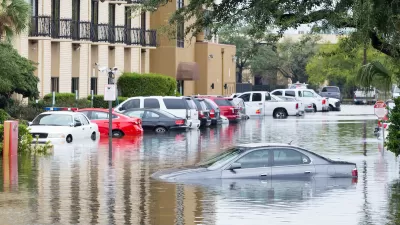Not sure if you want to be a planner? Recently my colleagues and I have received a spate of emails from prospective students around the world wanting to know whether planning is a field they should pursue. Their extensive lists of questions show that this is a pressing issue for them. This entry answers some of the more common questions and aims to help prospective students come to programs with a shorter and more focused set of topics to explore.
Not sure if you want to be a planner? Recently my colleagues
and I have received a spate of emails from prospective students around the world
wanting to know whether planning is a field they should pursue. Their extensive
lists of questions show that this is a pressing issue for them. This entry
answers some of the more common questions and aims to help prospective students
come to programs with a shorter and more focused set of topics to explore.
- Is Planning for Me?
-
Will there be Jobs
for Planners in the Future? -
Where do Planners
Work? -
How do I Know which
Programs are Good for What? - What if I Have a
Really Specific Interest?
Is Planning for Me?
Finding out if planning is for you involves looking at what
planners do.
Investigate the web sites of major planning,
urban, and regional organizations. Some specifically deal with the planning
profession, e.g. the American Planning Association or Planners Network. Others
deal with related topics like the Association for Community Design, Urban Land
Institute, or Urban Affairs Association. There are many such organizations
around the world. If you get to the American Society of Landscape Architects,
American Institute of Architects, National Association of Social Workers, the Society for Conservation
Biology, or National Recreation and Parks Association and find more of
interest, you may wish to go into a related field.- Other magazines and web sites deal with planning
issues. Planning, Progressive Planning, and Shelterforce magazines are good
places to start. The Project for Public Spaces, UN Habitat, and many other web
sites deal with planning issues-explore them. To find some of these other
resources, read my earlier advice entries on various resources that can tell
you about planning: Finding online resources to increase your planning
knowledge including:
images, articles,
organizations,
faculty blogs, books, and more books.
Will there be Jobs
for Planners in the Future?
Yes there will be jobs for planners. The world
is urbanizing creating issues that need to be solved in cities and regions. The
importance of natural systems becoming more and more apparent, but many
environmental fields are becoming highly specialized, leaving a gap that
planners can fill.
Where do Planners
Work?
Planners may do this work in government, for the
private sector that is often working for government, or in nonprofit groups.
There are lots of different locations for planning work.
How Do I Choose a
Planning Program?
Read my earlier column on finding the right program
and applying to graduate school (scroll down to find my advice about how to
investigate graduate schools).
In that entry I give the following tips:
- In the United States find
planning programs at http://www.planningaccreditationboard.org/index.php?id=30,
non-accredited at http://www.acsp.org/CareerInfo/Non-Accredited_ACSP_Member_Schools.html, and
affiliated schools at http://www.acsp.org/CareerInfo/AffiliateMemberSchools.htm.
Other countries have similar lists, - Then,
as I said in my earlier post: "to make a short list the first things to do
are to read and listen." Look at web sites, read the program materials,
look at what faculty have done (it is typically listed on the school web sites or can be Googled) and read their work. Do the classes offered
interest you? What about research centers and outreach projects? Did some
of the faculty write articles you found interesting when doing your
initial reading (above)? Does student work on the web sites look relevant?
My rule of thumb is to go somewhere where at least two faculty members do
work that really interests you and where the students look interesting too. - You
can also visit schools for open houses and look on campus. However, as I
said in my earlier post on applying to graduate school: "in my experience
it does not help your chances of admission to visit a school before being
admitted. Some schools receive hundreds of applicants. Don't expect
faculty to put aside their other tasks to meet or answer detailed email
questions before you have been admitted-their priority is students already
in the program and doing the work that makes you interested in studying
with them."
Sure you can visit. It can help you decide if you want to apply. I meet with dozens of such students each year. But you
can find out a lot without burning fossil fuel to get to a distant campus.
How do I Know which
Programs are Good for What?
If you have done all the investigation I suggest above you
should know which programs have interesting classes, students, projects, and
faculty. While Planetizen does have its ranking there is really no substitute
for this work.
What if I Have a
Really Specific Interest?
There are two options for those with specific interests.
- If it
is some common area like urban design or transportation then pick programs
that have that emphasis (faculty, courses, projects). However, don't forget that many people evolve new
interests in graduate school so its risky to go to a place with just one
focus. - If
your area is not a typical subfield of planning or is at the intersection
of planning and other areas--planning for food systems, universal design
and planning-you need a more complicated approach. Pick a place with some
combination of the following:- At
least one faculty member with a minor or major interest in the topic and a few more who
might have overlapping concerns. - Classes
across campus and a planning program with plenty of electives so that you
can do those classes. - Dual
degrees in place that will allow you to explore your interests.
- At
In general, there is no substitute for reading, going to
conferences, attending planning meetings-all part of a thorough investigation
into topics that presumably interest you and a field that may be your future.
This is the March blog
entry delayed. Other earlier blogs may be of interest including several on
getting into graduate school in planning: how to find the right program, apply, and decide which
offer to take up. In addition I have written about how to make the most of
being a student
and when (not) to email experts.

Alabama: Trump Terminates Settlements for Black Communities Harmed By Raw Sewage
Trump deemed the landmark civil rights agreement “illegal DEI and environmental justice policy.”

Planetizen Federal Action Tracker
A weekly monitor of how Trump’s orders and actions are impacting planners and planning in America.

Why Should We Subsidize Public Transportation?
Many public transit agencies face financial stress due to rising costs, declining fare revenue, and declining subsidies. Transit advocates must provide a strong business case for increasing public transit funding.

Understanding Road Diets
An explainer from Momentum highlights the advantages of reducing vehicle lanes in favor of more bike, transit, and pedestrian infrastructure.

New California Law Regulates Warehouse Pollution
A new law tightens building and emissions regulations for large distribution warehouses to mitigate air pollution and traffic in surrounding communities.

Phoenix Announces Opening Date for Light Rail Extension
The South Central extension will connect South Phoenix to downtown and other major hubs starting on June 7.
Urban Design for Planners 1: Software Tools
This six-course series explores essential urban design concepts using open source software and equips planners with the tools they need to participate fully in the urban design process.
Planning for Universal Design
Learn the tools for implementing Universal Design in planning regulations.
Caltrans
Smith Gee Studio
Institute for Housing and Urban Development Studies (IHS)
City of Grandview
Harvard GSD Executive Education
Toledo-Lucas County Plan Commissions
Salt Lake City
NYU Wagner Graduate School of Public Service






























